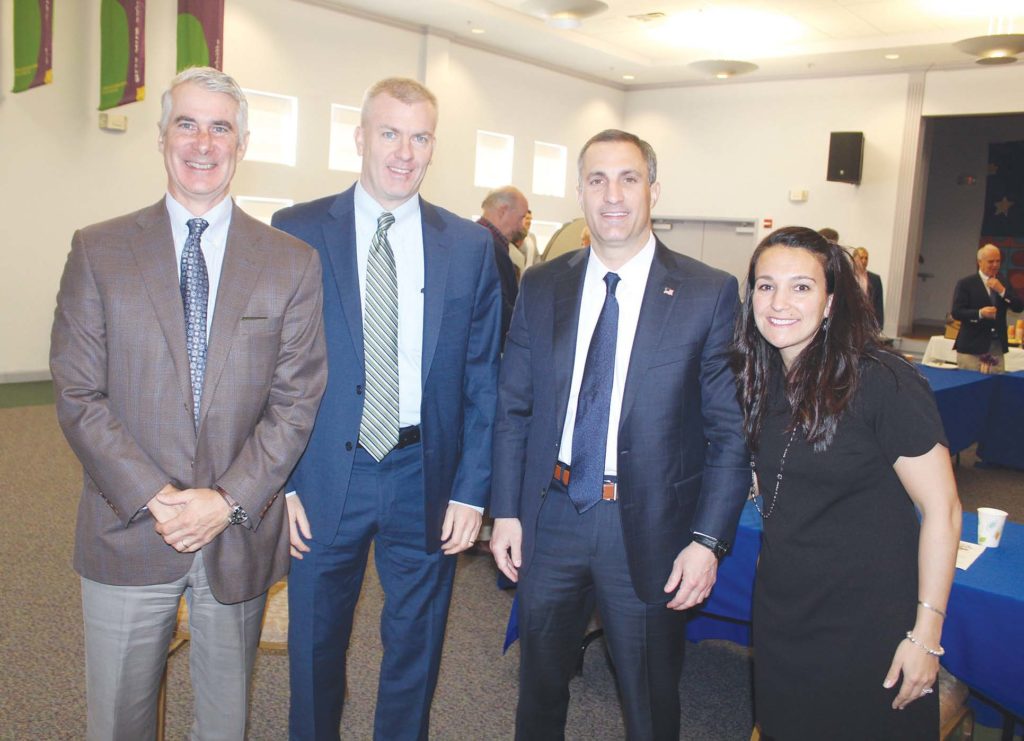He had his audience totally engaged on every word, his knowledge so overwhelming, his delivery so confident and precise.

Joseph R. Bonavolonta, FBI special agent in charge of the Boston Field Office, was the guest speaker at the Jordan Boys and Girls Club Breakfast Series Tuesday and his remarks were so captivating that he received two other guest speaking invitations before he left the hall.
“It’s been an incredibly interestingly and enlightening morning – that was great,” said Breakfast Chair Mark Robinson at the conclusion of Bonavolonta’s remarks.
Bonavolonta took the guests on an up-close look at the vital work that the United States’ principal law enforcement agency does around the clock and how it affects people not only in this nation but around the world.
He began by illuminating “about the types of threats we’re facing in our AOR (Area of Responsibility),” which is the four-state region of Maine, New Hampshire, Massachusetts, and Rhode Island.
He divided the subject matter between the categories of national security threats and criminal threats.
“I’ll start with pure national security, that’s really where we’re focusing on our counter-terrorism and counter-intelligence threats, two of the absolute top threats, not only here in our area, but also nationally,” said Bonavolonta.
He said the FBI is focusing on two types of counter-terrorism, international terrorism and domestic terrorism.
“International terrorism is where you have your historical terrorism threats, really pre-and-post 911: Al Qaeda and ISIS, They still are persistent. They still are significant threats for us, but the threat landscape in terrorism has really changed every year since September 11, 2001,” he said.
Bonavolonta noted that the primary threat here is Homegrown Violent Extremists (HVE). “What I mean by that, simply, are individuals who have been self-radicalized primarily over the Internet – it could be by other means as well. They go out and commit significant acts of violence against what we would call or they call to be soft targets: schools, shopping malls, any areas where there are public gatherings where you can potentially inflict mass casualties with the lowest amount of risk or immediate interaction with law enforcement.
“It’s something that concerns us every day,” said Bonavolonta.
He said the agency has to take each threat seriously and be very quick to react. “We’ve had cases right in our own area where we’ve had individuals that have one day woken up and they’re in that radicalization process and they’ve decided that today’s the day they’re going to go out and they’re going to attack or kill members of law enforcement or other individuals.
“These are threats that have to be acted on immediately and we have to ready to mobilize and cut them off before they commit these acts of violence,” he said.
Bonavolonta defined domestic terrorism “as individuals who are associated with or inspired by US-based movements that are promoting ‘violent extremist ideologies.”
He said what makes domestic terrorism a complex issue is “the fact that a lot of what we see in that realm potentials butts right up against First Amendment freedom of speech issues.
“That’s something that we really have to be incredibly careful when we’re looking at it. It’s a very, very high threshold for us to predicate a case where we’re charging acts related to domestic terrorism.
“In a lot of cases, these issues start with individuals that are spewing certain types of speech that are protected under First Amendment activities,” Bonovalonta clarified.
During the question-and-answer session that followed, Bonavolonta was asked about FBI resources, hiring and personnel.
He said the FBI is always looking for “cyber-talented people with a true background in cyber skills.”
“And nationally we are making a significant push for much more aggressive recruitment – we are aggressively recruiting people with skills in the STEM field,” said Bonavalonta. “We are placing a specific emphasis on recruiting females into the agent cadre as well. We need to make sure that from a diversity perspective that our agent cadre, as much as it can, mirrors overall society. And just within the last three or four years, there has been a very definitive effort to proactively put on female law enforcement symposiums.”